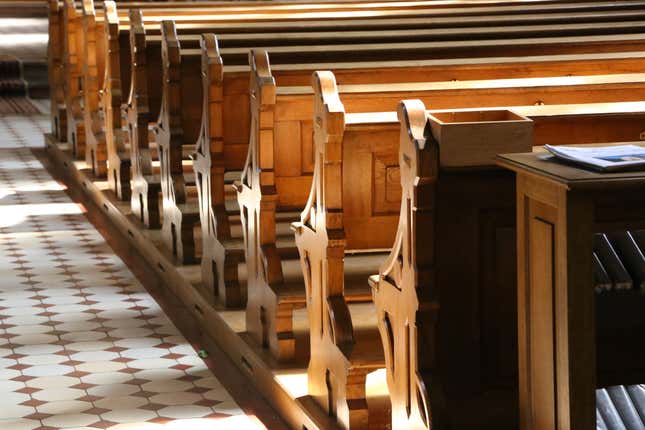
The topic of reparations is a touchy one...for white people. While the American government hasn’t touched the topic in a serious way, churches across the country are taking it upon themselves to try and make amends for the role they played in the slave trade.
According to the Associated Press, there is a renewed interest among churches, particularly within the Episcopal Church, in creating programs and making financial investments that would benefit the Black community. There has also been a growing effort to acknowledge the symbiotic relationship the church had with the slave trade.
These acknowledgments have come in many forms, from the Episcopal Diocese of Texas recognizing its first bishop was a slave owner, to an Episcopal church in New York City erecting a plaque noting that the building only stands due to wealth accumulated through slavery. The Minnesota Council of Churches has launched a “truth and reparations” initiative that is in part modeled after the Truth and Reconciliation Commission established in South Africa post-apartheid.
“Minnesota has some of the highest racial disparities in the country—in health, wealth, housing, how police treat folks,” the council’s CEO, the Rev. Curtiss DeYoung, told the AP. “Those disparities all come from a deep history of racism.”
DeYoung cited the police killing of George Floyd as being a “call to action” for the church. “The first thing that we did, of course, like everyone else, was get into the streets and march...but there are deep, historic issues that require more than marching,” DeYoung said.
From Associated Press:
Another notable aspect of the Minnesota initiative is that it seeks to address social justice concerns of African Americans and Native Americans in a unified way,
“For so long these have been two separate camps — Indigenous people and African Americans felt they are competing against each other for the same limited resources,” said the Rev. Jim Bear Jacobs, a Native American who is the church council’s director of racial justice.
“By bringing these two communities together, it removes that mindset of, ‘We have to get ours, and that might mean you don’t get yours,’” he said.
Jacobs belongs to a Wisconsin-based Mohican tribe but was born in Minnesota and is well-versed in the grim chapters of the latter’s history regarding Native Americans. He cited the U.S.-Dakota War of 1862, which ended with the internment of hundreds of Dakota people and the hanging of 38 Dakota men in Mankato — the largest mass execution in U.S. history. After the war, many of the Dakota were expelled from the state.
The Episcopal Church has been leading the way with reparations initiatives, with dioceses in Maryland, Texas, and New York all having launched programs over the last year. In February, the diocese in Texas made one of the largest pledges, allocating $13 million towards long-term programs that would benefit the Black community.
While the Episcopal Church has been notably active in creating these programs, there is no official policy on reparations within the church, with New York Bishop Andrew Dietsche telling the AP that “Each diocese will make its own decisions how to do this work.”
“What is common across the whole church is the recognition that it’s time to address and reckon with the wrongs and evils of our past,” Dietsche added.
I can’t lie, this is all pretty cool. I was aware of the role Christianity played in slavery, mainly the Bible being used to morally justify slavery, but I wasn’t aware that the church was active in the slave trade. It’s kind of sad that the church is taking greater steps towards reparations than the government.
There is always the argument of “well you weren’t a slave and I wasn’t a slave owner so reparations are pointless” but that line of thinking ignores the basic fact that what happened in the past has shaped our present. Eugene Sutton, the first Black cleric to become bishop of Maryland told the AP that he frequently talks with white people who hold that position and he finds it to be “a false conception.”
“Reparations is simply, ‘What will this generation do to repair the damage caused by previous generations?’...We may not all be guilty, but we all have a responsibility,” Sutton told AP.
Other denominations have started taking similar steps toward reparations. Certain conferences within the United Methodist Church are taking cues from the Episcopal Church as it explores programs that could potentially benefit the Black community. Kenneth Carter, bishop of the UMC’s Florida Conference, has launched an anti-racism task force and told AP that financial reparations are a likely next step.
The U.S. Conference of Catholic Bishops hasn’t advocated for reparations by name but a pastoral letter from 2018 did call for programs that would “help repair the damages caused by racial discrimination.”
For certain Black Catholics, those lukewarm commitments aren’t enough, citing the church’s historical involvement in the slave trade and segregation. Shannen Dee Williams, a Black historian at Villanova University, has proposed multiple initiatives that she believes the church should take. These include a formal apology, providing greater access to Catholic schools in Black communities, and requiring Black Catholic history to be mandatory in these schools.
“Black Catholic history reminds us that the Church was never an innocent bystander in the histories of colonialism, slavery or segregation,” Williams told AP in an email.

